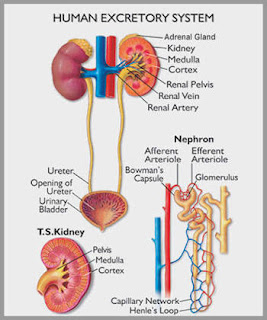Answers of Quiz 1739 (Human Excretory System)
1. The excretory system performs the function of excretion, the bodily process of discharging wastes. The excretory system is responsible for the elimination of wastes produced by homeostasis.
2. Excretion is the process by which waste products of metabolism & other non-useful materials are eliminated from an organism.
3. Lungs, Kidneys, Skin, large intestine & liver
4. Kidneys
5. Homeostasis is the process that maintains the stability of the human body's internal environment in response to changes in external conditions.
6. Osmoregulation is the active regulation of the osmotic pressure of an organism's body fluids to maintain the homeostasis of the organism's water content; that is, it maintains the fluid balance & the concentration of electrolytes (salts in solution) to keep the fluids from becoming too diluted or too concentrated.
7. On each side of vertebral column in abdominal cavity.
8. Kidneys remove from blood the nitrogenous wastes such as urea, as well as salts & excess water, & excrete them in the form of urine.
9. Every day, two kidneys filter about 120 to 150 quarts of blood to produce about 1 to 2 quarts of urine, composed of wastes & extra fluid.
10. Nephron
11. Nephrons are the structural & functional units of Kidneys.
12. Urine is composed of unwanted substances that have been filtered from blood by nephrons.
13. Urinary System or Renal System is to eliminate wastes from the body, regulate blood volume & blood pressure, control levels of electrolytes & metabolites & regulate blood pH.
14. We will die
15. Sweat glands in the skin secrete a fluid waste called sweat or perspiration; however, its primary functions are temperature control and pheromone release. Sweating also maintains the level of salt in the body.



Comments
Post a Comment